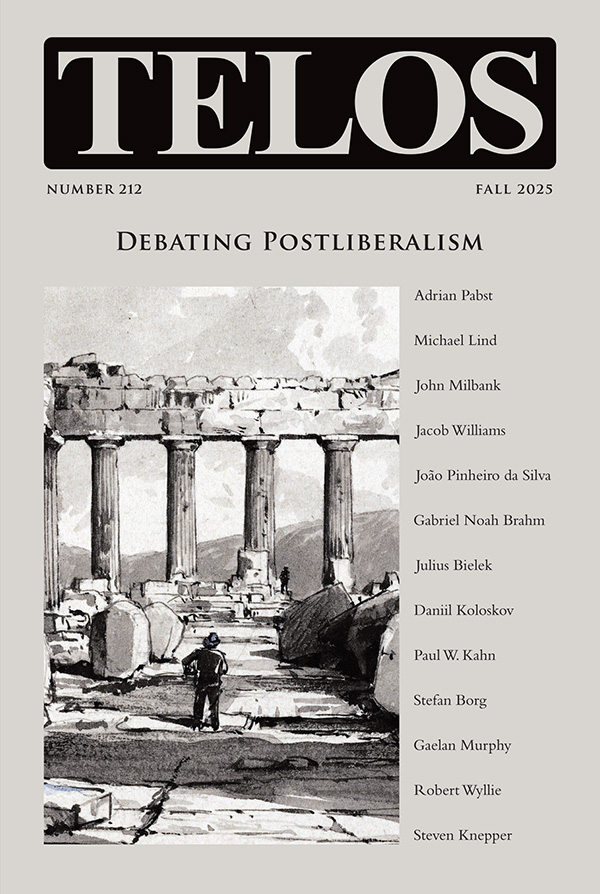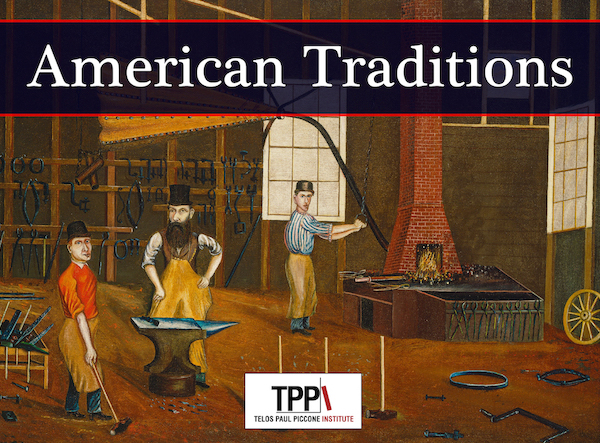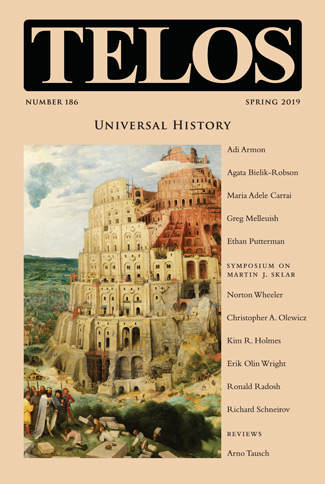By Adrian Pabst · Friday, October 3, 2025 Telos 212 (Fall 2025): Debating Postliberalism is now available for purchase in our store. Individual subscriptions to Telos are also available in both print and online formats.
 In 1998, Alan Wolfe remarked that “the right won the economic war, the left won the cultural war, and the center won the political war.” It was the age of triumphant liberalism, freed from the shackles of the Cold War confrontation between the capitalist West and the Communist East. Capitalism was now the uncontested model, as Western countries increasingly abandoned a more embedded social market economy in favor of the global market-state while emerging market economies embraced the state-market. In each case, society was the loser. Even as countries converged internationally and China morphed into an economic powerhouse, asset and income inequality increased within countries, and so did regional disparities—between the former heartlands of the Rust Belt and the new metropolitan hubs exemplified by Silicon Valley. Building on the writings of Paul Piccone and Christopher Lasch, critics of liberalism such as Christophe Guilluy, Nancy Fraser, Michael Lind, and Quinn Slobodian have highlighted the growing gulf between elite enclaves and peripheral wastelands, or hubs vs. heartlands, but their analysis has mostly been dismissed as nostalgic or downright reactionary. Something similar applies to politicians on both sides of the spectrum who have questioned liberal economics—whether Pat Buchanan in the past or JD Vance and Josh Hawley more recently on the Republican right, or Bernie Sanders, Ro Khanna, and Chris Murphy on the Democratic left. In 1998, Alan Wolfe remarked that “the right won the economic war, the left won the cultural war, and the center won the political war.” It was the age of triumphant liberalism, freed from the shackles of the Cold War confrontation between the capitalist West and the Communist East. Capitalism was now the uncontested model, as Western countries increasingly abandoned a more embedded social market economy in favor of the global market-state while emerging market economies embraced the state-market. In each case, society was the loser. Even as countries converged internationally and China morphed into an economic powerhouse, asset and income inequality increased within countries, and so did regional disparities—between the former heartlands of the Rust Belt and the new metropolitan hubs exemplified by Silicon Valley. Building on the writings of Paul Piccone and Christopher Lasch, critics of liberalism such as Christophe Guilluy, Nancy Fraser, Michael Lind, and Quinn Slobodian have highlighted the growing gulf between elite enclaves and peripheral wastelands, or hubs vs. heartlands, but their analysis has mostly been dismissed as nostalgic or downright reactionary. Something similar applies to politicians on both sides of the spectrum who have questioned liberal economics—whether Pat Buchanan in the past or JD Vance and Josh Hawley more recently on the Republican right, or Bernie Sanders, Ro Khanna, and Chris Murphy on the Democratic left.
Some political and policy differences notwithstanding, the mainstream left and right—in the United States, Europe, and other Western countries such as Japan, South Korea, Australia, and New Zealand—took a progressive turn and embraced untrammeled markets, hyper-individualism, and foreign military adventures. The ruling elites felt vindicated by the “end of history” utopia of a global convergence toward liberal market democracy and the inevitable forward march of globalization. Both liberal interventionists and neoconservative crusaders advanced the vision of America as a liberal Leviathan that secures the social contract at home and U.S. supremacy abroad.
Continue reading →
By Gerald Berk · Thursday, May 30, 2024 I am a professor emeritus of political science at the University of Oregon, and I am an observant, progressive Jew. I appreciate the efforts of conservatives, some of whom have made valuable contributions to the Telos-Paul Piccone Institute’s Israel initiative, to expose antisemitism in my profession and among my students since October 7. I share their concern that anti-Zionism has become one plank in an anti-liberal, anti-capitalist, anti-American project characteristic of some segments of the contemporary left. It’s vital to bear in mind that Jews have thrived when liberal, American values and institutions have been strong.
 
Does this mean, as Bari Weiss counsels, that I should join Jews in a lockstep turn to the right? I think not. Twenty-five years ago, in Achieving Our Country, Richard Rorty challenged what he called the “cultural left” to suspend high theory, identity politics, and cultural revolution to attend instead to the economic distress of the many Americans left behind by neoliberalism. He challenged an increasingly anti-American left to build a left-wing patriotism. And he pointed to domestic historical resources to realize those aims in the work of Emerson, Whitman, and Dewey. Rorty feared the alternative to such pragmatic liberalism was an authoritarian demagogue, who would reverse the gains of identity politics and usher in an era of American fascism.
Continue reading →
By Telos Press · Tuesday, December 28, 2021 Today’s episode of the Telos Press Podcast features a panel discussion of Timothy W. Luke’s new book, The Travails of Trumpification, published earlier this month by Telos Press. The discussion, in which Tim is joined by David Pan, Fred Siegel, and Mark S. Weiner, covers a range of topics and questions, including the meaning and origins of “Trumpification”; Trump’s contempt for democratic liberal norms; the emergence of a progressive habitus in the early twentieth century; the critique of liberal managerialism; the rhetoric of the “forgotten little guy” (à la Rodney Dangerfield); the purposeful use of ignorance to send up the degreed classes; the extent to which Trump emerged out of “Nixonland”; Trump’s undermining of the claims of scientific truth; the relationship of science to political interest, and how each should inform the other; the populist attack on the New Class; Trump’s elevation of individual winning over larger collective interests and the public good; the weakening of a rationalist epistemology on which democracy depends in favor of an ethos of pure power; how the Afghanistan withdrawal and the coronavirus pandemic exacerbated the public’s disdain for expertise; and how power might be shifted from the administrative state to the local level as a way of integrating all members of the public in political decision-making and thereby revitalizing citizenship. Timothy W. Luke’s The Travails of Trumpification is now available in our online store, where you can save 20% off the list price by using the coupon code BOOKS20.
Listen to the podcast here.
Continue reading →
By Florindo Volpacchio · Tuesday, October 27, 2020 Isaac Lopez’s comments in “Why Trump Will Win” anticipate Trump’s reelection as the result of a reactionary backlash by a conservative moderate public. This backlash is directed at a weak and failing leadership in the Republican Party and a Democratic Party that has abandoned the “silent majority” for the interests of minorities and women. Yet not only is it questionable whether this analysis of the backlash offers any insight, it is questionable whether the backlash is even representative of mainstream public opinion. There is more of a consensus for the progressive agenda than Lopez is willing to admit. The wealthy suburbs of New York are as much inclined to vote for a progressive Black gay candidate as a working-class district in Queens is inclined to elect a progressive Latinx. Most of all, let us not forget that even in the face of personal animosity, Hillary Clinton won the popular vote by 3 million votes. So how does all of this square with the reactionary backlash of the “silent majority”?
As we all know, Trump won the presidency through the Electoral College by winning Michigan, Wisconsin, and Pennsylvania with about 70 thousand votes. It is possible that the reactionary backlash in these states flipped them for Trump. But not only does this not make them representative of public opinion, given the fragmented, unverified, and biased sources that feed public opinion today; it is questionable whether the reactionary backlash is itself founded on serious grievances. With demographic inequalities shifting the balance of federal power to states less representative of the national consensus, the outcome of presidential elections is determined by a few states where local opinion, whether informed, uninformed, or dis-informed, can determine the long-term outcome of national politics.
Continue reading →
By Erik Olin Wright · Thursday, May 9, 2019 Erik Olin Wright’s “Martin Sklar’s Theory of Capitalism and Socialism” appears in Telos 186 (Spring 2019). Read the full article at the Telos Online website, or purchase a print copy of the issue in our online store. Individual subscriptions to Telos are available in both print and online formats.
 This essay explores how Martin Sklar’s typology of the patterns of thought that have animated social and political struggles in capitalist societies since the mid-nineteenth century can, with some modification, be incorporated into a more general analytical framework for thinking about alternatives to capitalism. Sklar frames his analysis primarily in terms of two contrasts—between what he calls “utopian” and “realist” modes of thoughts, and between capitalism and socialism as ways of organizing political-economy institutions. He supports a realist mode of thought that examines the ways in which socialist elements emerge within capitalism, creating various kinds of hybrids through what he calls the “capitalism/socialism interplay.” The prospects for progressive social change come out of that interplay. This essay proposes modifying Sklar’s framework in two respects: First, rather than rejecting the utopian mode of thought, utopian models can be useful as a way of clarifying the normative foundations of struggles for human emancipation and the logical connections between different elements of proposed alternatives to existing institutions and social structures. Second, while Sklar is correct that real economic systems contain hybrids of capitalist and noncapitalist elements, it is a mistake to lump all relevant noncapitalist elements under the rubric “socialist.” Specifically, it is useful to distinguish statism from socialism. This creates a more nuanced conceptual map of possibilities and points more clearly to the problem of democratizing state and democratizing the economy as the central task of progressive politics. This essay explores how Martin Sklar’s typology of the patterns of thought that have animated social and political struggles in capitalist societies since the mid-nineteenth century can, with some modification, be incorporated into a more general analytical framework for thinking about alternatives to capitalism. Sklar frames his analysis primarily in terms of two contrasts—between what he calls “utopian” and “realist” modes of thoughts, and between capitalism and socialism as ways of organizing political-economy institutions. He supports a realist mode of thought that examines the ways in which socialist elements emerge within capitalism, creating various kinds of hybrids through what he calls the “capitalism/socialism interplay.” The prospects for progressive social change come out of that interplay. This essay proposes modifying Sklar’s framework in two respects: First, rather than rejecting the utopian mode of thought, utopian models can be useful as a way of clarifying the normative foundations of struggles for human emancipation and the logical connections between different elements of proposed alternatives to existing institutions and social structures. Second, while Sklar is correct that real economic systems contain hybrids of capitalist and noncapitalist elements, it is a mistake to lump all relevant noncapitalist elements under the rubric “socialist.” Specifically, it is useful to distinguish statism from socialism. This creates a more nuanced conceptual map of possibilities and points more clearly to the problem of democratizing state and democratizing the economy as the central task of progressive politics.
Continue reading →
By Kim R. Holmes · Wednesday, May 1, 2019 Kim R. Holmes’s “A Man between Two Worlds: Assessing Martin Sklar’s Philosophy of Liberalism” appears in Telos 186 (Spring 2019), as part of a symposium on Martin J. Sklar. Read the full article at the Telos Online website, or purchase a print copy of the issue in our online store. Individual subscriptions to Telos are available in both print and online formats.
 Martin Sklar is an underappreciated thinker. The fact that he was a leading intellectual of the New Left in the 1960s and remained a self-identified leftist gave him a unique historical perspective. It enabled him to cut through many misunderstandings and clichés about the history of American liberalism, and gives us an opportunity to understand the left’s theory of community in a different light. One of Sklar’s central theses is his contention that the American system during the Progressive Era became a “mix” of capitalism and socialism. Looking at this background, one of Sklar’s more prescient theses is his distinction between the “broad left” and the “sectarian left.” This also informs his insightful idea of the “transvestiture of left and right”—that the left and right have largely changed historical places on ideas. The postmodern left is very different from, and indeed has largely broken off ideologically from, classic as well as mainstream liberalism as it has been understood in the past. One very important component missing from Sklar’s approach is religion. It must be recognized that the post-revolutionary construct in America helped ensure that the freedom of civil society as a liberal project could not fully flourish without the support of religion. Sklar’s work illuminates the great intellectual divide between classic liberalism and socialism, and between the moderate and radical Enlightenment legacies, which rest on two different views of human nature. However, if a choice had to be made between liberty and the dictates of community, Sklar always chose liberty. Martin Sklar is an underappreciated thinker. The fact that he was a leading intellectual of the New Left in the 1960s and remained a self-identified leftist gave him a unique historical perspective. It enabled him to cut through many misunderstandings and clichés about the history of American liberalism, and gives us an opportunity to understand the left’s theory of community in a different light. One of Sklar’s central theses is his contention that the American system during the Progressive Era became a “mix” of capitalism and socialism. Looking at this background, one of Sklar’s more prescient theses is his distinction between the “broad left” and the “sectarian left.” This also informs his insightful idea of the “transvestiture of left and right”—that the left and right have largely changed historical places on ideas. The postmodern left is very different from, and indeed has largely broken off ideologically from, classic as well as mainstream liberalism as it has been understood in the past. One very important component missing from Sklar’s approach is religion. It must be recognized that the post-revolutionary construct in America helped ensure that the freedom of civil society as a liberal project could not fully flourish without the support of religion. Sklar’s work illuminates the great intellectual divide between classic liberalism and socialism, and between the moderate and radical Enlightenment legacies, which rest on two different views of human nature. However, if a choice had to be made between liberty and the dictates of community, Sklar always chose liberty.
Continue reading →
|
|
 In 1998, Alan Wolfe remarked that “the right won the economic war, the left won the cultural war, and the center won the political war.” It was the age of triumphant liberalism, freed from the shackles of the Cold War confrontation between the capitalist West and the Communist East. Capitalism was now the uncontested model, as Western countries increasingly abandoned a more embedded social market economy in favor of the global market-state while emerging market economies embraced the state-market. In each case, society was the loser. Even as countries converged internationally and China morphed into an economic powerhouse, asset and income inequality increased within countries, and so did regional disparities—between the former heartlands of the Rust Belt and the new metropolitan hubs exemplified by Silicon Valley. Building on the writings of Paul Piccone and Christopher Lasch, critics of liberalism such as Christophe Guilluy, Nancy Fraser, Michael Lind, and Quinn Slobodian have highlighted the growing gulf between elite enclaves and peripheral wastelands, or hubs vs. heartlands, but their analysis has mostly been dismissed as nostalgic or downright reactionary. Something similar applies to politicians on both sides of the spectrum who have questioned liberal economics—whether Pat Buchanan in the past or JD Vance and Josh Hawley more recently on the Republican right, or Bernie Sanders, Ro Khanna, and Chris Murphy on the Democratic left.
In 1998, Alan Wolfe remarked that “the right won the economic war, the left won the cultural war, and the center won the political war.” It was the age of triumphant liberalism, freed from the shackles of the Cold War confrontation between the capitalist West and the Communist East. Capitalism was now the uncontested model, as Western countries increasingly abandoned a more embedded social market economy in favor of the global market-state while emerging market economies embraced the state-market. In each case, society was the loser. Even as countries converged internationally and China morphed into an economic powerhouse, asset and income inequality increased within countries, and so did regional disparities—between the former heartlands of the Rust Belt and the new metropolitan hubs exemplified by Silicon Valley. Building on the writings of Paul Piccone and Christopher Lasch, critics of liberalism such as Christophe Guilluy, Nancy Fraser, Michael Lind, and Quinn Slobodian have highlighted the growing gulf between elite enclaves and peripheral wastelands, or hubs vs. heartlands, but their analysis has mostly been dismissed as nostalgic or downright reactionary. Something similar applies to politicians on both sides of the spectrum who have questioned liberal economics—whether Pat Buchanan in the past or JD Vance and Josh Hawley more recently on the Republican right, or Bernie Sanders, Ro Khanna, and Chris Murphy on the Democratic left. 




